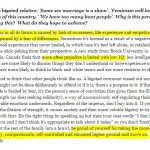So many conversations involve looking inside someone’s head. Amateur psychologists are everywhere.
In Bible study: “Moses was probably conflicted”; “It must be that Joshua was feeling vulnerable”; ‘Paul’s upbringing made him overly dogmatic.”
In a planning team: “I don’t think she has the right personality to do that job.”
In disagreement: “He must have had a bad experience to think that way”; “I can’t change that, because I need to express myself.”
In these cases, I think the appeal to psychology explains everything (now we know why). And it explains exactly nothing (we don’t have to think about it any more).
My appeal is this: forget the inner forces until we’ve wrestled with the outer detail.
Take the example of reading the Bible. In the modern west, much of our literature concerns the inner life. Novels explore and express the desires, rages, fears, joy and hurts of their characters. We too easily read the Bible as if it’s the same. But the Bible has little comment upon the motives and drives of its rich array of people. It has its own way: plot and narrative, hints and unfolding drama, small details that later become huge. It’s much better if we read the Bible as the Bible. Let its details capture us, instead of forcing it to fit our kinds of writing.
 So too with understanding people. Have a look at the screenshot I took from this article. It’s atrocious! The aim of the piece is to help people cope during Christmas. This section is totally superior, smug and self-satisfied. And uses ‘psychology’ to justify arrogance.
So too with understanding people. Have a look at the screenshot I took from this article. It’s atrocious! The aim of the piece is to help people cope during Christmas. This section is totally superior, smug and self-satisfied. And uses ‘psychology’ to justify arrogance.
What should we do if someone says, as suggested here, ‘We have too many boat people’? I don’t think that statement is true at all, but this author gives me permission to proudly look down on one who holds this opinion.
For a start, the author has already decided it’s bigotry – no reasoning required. Secondly, the boat people opinion is ascribed to deficiency and fear: ‘lack of awareness … often underpinned by a fear of difference.’ Finally, the opinion is scientifically-proven to be dumb: ‘prejudice is linked with low IQ’.
What an arrogant smack-down!
Even better, though, is how the author tells us to exalt ourselves. Once you’ve avoided the topic: ‘be proud of yourself for taking the more worldly, compassionate, self-controlled and educated higher ground and move on.’
All this stuff couched in misused psychological terms, when I could have simply said: ‘I’d like to know your reasons for that, as long as you are open to changing your mind.’
As I said before: forget the inner forces until we’ve wrestled with the outer detail.
When we do this, psychology and the inner life will still be important. And they will be more powerful, I believe. Properly-qualified psychologists will be able to share their insight. Passions in Bible characters will stand out even more clearly (Jesus’ tears in the Garden of Gethsemane, for example). And when everyday folk talk, we will experience true listening and interaction.
